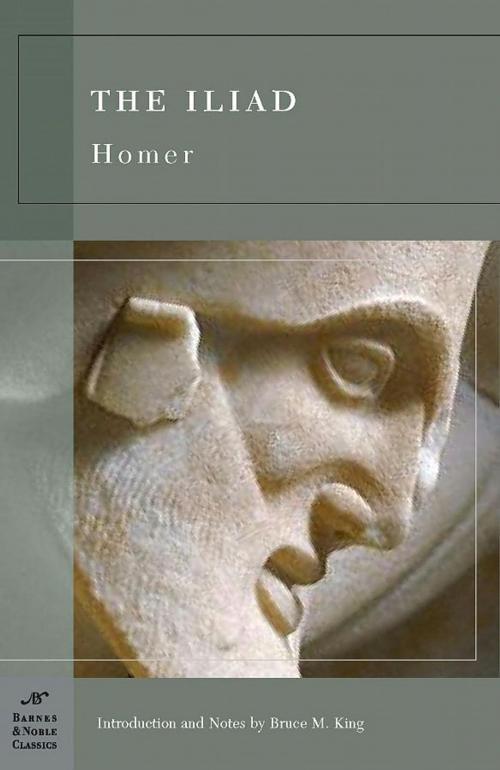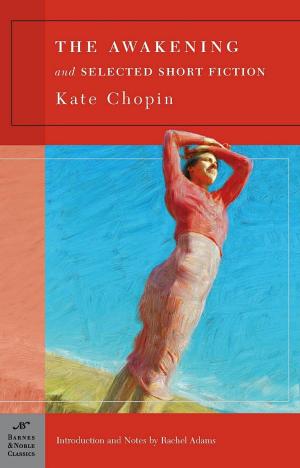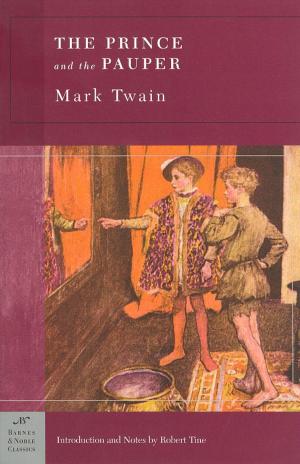| Author: | Homer | ISBN: | 9781411432376 |
| Publisher: | Barnes & Noble Classics | Publication: | June 1, 2009 |
| Imprint: | Barnes & Noble Classics | Language: | English |
| Author: | Homer |
| ISBN: | 9781411432376 |
| Publisher: | Barnes & Noble Classics |
| Publication: | June 1, 2009 |
| Imprint: | Barnes & Noble Classics |
| Language: | English |
The Iliad, by Homer, is part of the Barnes & Noble Classics* *series, which offers quality editions at affordable prices to the student and the general reader, including new scholarship, thoughtful design, and pages of carefully crafted extras. Here are some of the remarkable features of Barnes & Noble Classics:
- New introductions commissioned from today's top writers and scholars
- Biographies of the authors
- Chronologies of contemporary historical, biographical, and cultural events
- Footnotes and endnotes
- Selective discussions of imitations, parodies, poems, books, plays, paintings, operas, statuary, and films inspired by the work
- Comments by other famous authors
- Study questions to challenge the reader's viewpoints and expectations
- Bibliographies for further reading
- Indices & Glossaries, when appropriate
All editions are beautifully designed and are printed to superior specifications; some include illustrations of historical interest. Barnes & Noble Classics pulls together a constellation of influences—biographical, historical, and literary—to enrich each reader's understanding of these enduring works.
The epic song of Ilion (an old name for Troy), The Iliad recreates a few dramatic weeks near the end of the fabled Trojan War, ending with the funeral of Hector, defender of the doomed city. Through its majestic verses stride the fabled heroes Priam, Hector, Paris, and Aeneas for Troy; Achilles, Ajax, Menelaus, Agamemnon, Patroclus, and Odysseus for the Greeks; and the beautiful Helen, over whom the longstanding war has been waged. Never far from the center of the story are the quarreling gods: Zeus, Poseidon, Apollo, Hera, Athena, and Aphrodite.
The Iliad is the oldest Greek poem and perhaps the best-known epic in Western literature, and has inspired countless works of art throughout its long history. An assemblage of stories and legends shaped into a compelling single narrative, The Iliad was probably recited orally by bards for generations before being written down in the eighth century B.C. A beloved fixture of early Greek culture, the poem found eager new audiences when it was translated into many languages during the Renaissance. Its themes of honor, power, status, heroism, and the whims of the gods have ensured its enduring popularity and immeasurable cultural influence.
Bruce M. King studied at the University of Chicago, and has taught classics and humanities at Columbia University, Reed College, and the University of Chicago. Recently a Fellow at the Center for Hellenic Studies, King focuses on archaic and classical Greek literature and philosophy. He is currently a Blegen Research Fellow at Vassar College.
The Iliad, by Homer, is part of the Barnes & Noble Classics* *series, which offers quality editions at affordable prices to the student and the general reader, including new scholarship, thoughtful design, and pages of carefully crafted extras. Here are some of the remarkable features of Barnes & Noble Classics:
- New introductions commissioned from today's top writers and scholars
- Biographies of the authors
- Chronologies of contemporary historical, biographical, and cultural events
- Footnotes and endnotes
- Selective discussions of imitations, parodies, poems, books, plays, paintings, operas, statuary, and films inspired by the work
- Comments by other famous authors
- Study questions to challenge the reader's viewpoints and expectations
- Bibliographies for further reading
- Indices & Glossaries, when appropriate
All editions are beautifully designed and are printed to superior specifications; some include illustrations of historical interest. Barnes & Noble Classics pulls together a constellation of influences—biographical, historical, and literary—to enrich each reader's understanding of these enduring works.
The epic song of Ilion (an old name for Troy), The Iliad recreates a few dramatic weeks near the end of the fabled Trojan War, ending with the funeral of Hector, defender of the doomed city. Through its majestic verses stride the fabled heroes Priam, Hector, Paris, and Aeneas for Troy; Achilles, Ajax, Menelaus, Agamemnon, Patroclus, and Odysseus for the Greeks; and the beautiful Helen, over whom the longstanding war has been waged. Never far from the center of the story are the quarreling gods: Zeus, Poseidon, Apollo, Hera, Athena, and Aphrodite.
The Iliad is the oldest Greek poem and perhaps the best-known epic in Western literature, and has inspired countless works of art throughout its long history. An assemblage of stories and legends shaped into a compelling single narrative, The Iliad was probably recited orally by bards for generations before being written down in the eighth century B.C. A beloved fixture of early Greek culture, the poem found eager new audiences when it was translated into many languages during the Renaissance. Its themes of honor, power, status, heroism, and the whims of the gods have ensured its enduring popularity and immeasurable cultural influence.
Bruce M. King studied at the University of Chicago, and has taught classics and humanities at Columbia University, Reed College, and the University of Chicago. Recently a Fellow at the Center for Hellenic Studies, King focuses on archaic and classical Greek literature and philosophy. He is currently a Blegen Research Fellow at Vassar College.















